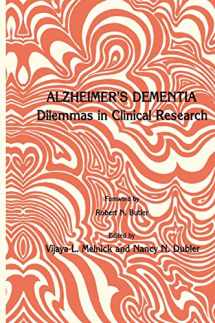
Alzheimer’s Dementia: Dilemmas in Clinical Research (Contemporary Issues in Biomedicine, Ethics, and Society)
ISBN-13:
9780896030671
ISBN-10:
0896030679
Edition:
1985
Author:
Nancy N. Dubler, Vijaya L. Melnick
Publication date:
1985
Publisher:
Humana
Format:
Hardcover
334 pages
Category:
Internal Medicine
,
Medical Ethics
,
Medicine
FREE US shipping
Book details
ISBN-13:
9780896030671
ISBN-10:
0896030679
Edition:
1985
Author:
Nancy N. Dubler, Vijaya L. Melnick
Publication date:
1985
Publisher:
Humana
Format:
Hardcover
334 pages
Category:
Internal Medicine
,
Medical Ethics
,
Medicine
Summary
Alzheimer’s Dementia: Dilemmas in Clinical Research (Contemporary Issues in Biomedicine, Ethics, and Society) (ISBN-13: 9780896030671 and ISBN-10: 0896030679), written by authors
Nancy N. Dubler, Vijaya L. Melnick, was published by Humana in 1985.
With an overall rating of 3.7 stars, it's a notable title among other
Internal Medicine
(Medical Ethics, Medicine) books. You can easily purchase or rent Alzheimer’s Dementia: Dilemmas in Clinical Research (Contemporary Issues in Biomedicine, Ethics, and Society) (Hardcover) from BooksRun,
along with many other new and used
Internal Medicine
books
and textbooks.
And, if you're looking to sell your copy, our current buyback offer is $0.3.
Description
The National Institute on Aging (NIA) has historically been concerned with the protection of human subjects. In July 1977, the NIA sponsored a meeting to update and supplement guide lines for protecting those participating in Federal research pro jects. Although the basic guidelines had been in effect since 1966, it had been neglected to include the elderly as a vulnerable population. In November 1981, the NIA organized a conference on the ethical and legal issues related to informed consent in senile dementia cases. The present volume offers the latest and best thinking on Alzheimer's Dementia to have emerged from the dialog that was first embarked upon at the NIA meeting. Indeed, the issues and concerns it treats now seem even more relevant than they appeared historically because of the vastly greater awareness in the community of the entire spectrum of problems Alzheimer's disease confronts us all with. Our interest and concern is both humanitarian and self serving. Clearly older people must be protected from in appropriate research and careful attention must be paid to the circumstances under which research is conducted on those older persons who have given anything less than full consent. It is equally necessary, however, for the research enterprise to be protected so that today's elderly and those of the future can benefit from the fruits of research.


We would LOVE it if you could help us and other readers by reviewing the book
Book review

Congratulations! We have received your book review.
{user}
{createdAt}
by {truncated_author}


